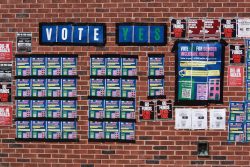The Georgetown Voice endorses Twister Murchison (SFS ‘08) and Salik Ishtiaq (SFS ‘07) in today’s GUSA executive election. Among this year’s candidates, we found no one who inspired us or provided a bold new vision for GUSA. Thus, we were forced to choose the candidates most likely to make their term one of institution-building and workman-like achievement.
Murchison and Ishtiaq have a concrete plan for their prospective administration. While their goals of “technology, safety and accessibility” may ring as mere platitudes, the multitude of specific implementable goals they offer evidences real ambition. Specific aspirations which seemed salient are expanding e-mail storage space and campus wireless access, fixing broken call-boxes, defending Saferides against complaints by community groups, improving access to campus spaces such as Riggs Library and improving GUSA’s communication with the student body.
Unfortunately, Murchison comes off as one of the most egregious slick-talkers this side of Bill Clinton, and during our interview with the ticket, neither candidate acknowledged in their criticisms of GUSA that they are in fact part of that establishment. Their platform is also not particularly original, and in many places seems to simply rehash perennial campaign platforms that never come to fruition.
Ultimately, however, it was the relationships both Murchison and Ishtiaq have forged on campus, as well as their cognizance of campus needs, that won our endorsement. Murchison is a leader in multiple community organizations and demonstrated clear, perhaps even excessive, knowledge of who in the administration and community he would need to work with to implement his plans.
The Murchison/Ishtiaq ticket comes across as the most competent to handle what we believe will ultimately be the defining issue of the coming GUSA executives’ terms of office, the use of the now-vacant Darnall space. Their previous GUSA experience, ties with many university leaders and ability to formulate workable plans for their coming administration lead us to draw this conclusion.
This year’s three tickets contrast starkly with last year’s nine. Perhaps Georgetown students choose not to run because they do not believe that GUSA has the power to accomplish anything worthwhile. Under President Pravin Rajan (SFS ‘07), however, GUSA followed through on programs that benefited students, including the Supper with the Jesuits program and the Raid on Student Aid campaign to protest cuts in federal financial aid. GUSA also assisted in the expansion of SafeRides, which now loops through West Georgetown and Burleith on weekend nights.
But GUSA remains an organization without institutional efficiency; it is entirely dependant on its executive for success.
GUSA’s main failure this past year, according to all of the candidates, was its inability to communicate with the students, both to seek student input and to share their achievements. With few exceptions, they had mostly the same solutions to the communication problem.
Communication was central to both the Khalil Hibri (SFS ‘07)/ Geoff Greene (SFS ‘07) and the Gage Raley (COL ‘07) / Oxana Miliaeva (COL ‘07) tickets. Hibri and Greene clearly articulated the problem and their proposed solutions. In general, they emphasized the necessity of going directly to the students to get their opinions. They pointed out how office hours were unlikely to be a successful way of increasing interaction between students and GUSA officials and instead proposed creating a presence in Red Square and at campus events. But Hibri lacks the necessary leadership experience to be GUSA President, and though extensive, his platform is far-fetched and would be difficult to implement.
As a GUSA outsider, Raley expressed his frustration at GUSA’s inaccesibility to the student body. In response to this problem, his web site proposes that GUSA invite all student organizations to appoint a representative to GUSA. He and his running-mate make an important argument about the lack of female representation in GUSA that the eventual winner should remember. But Raley’s vague platform and lack of experience in GUSA also disqualify him as a viable GUSA leader.
In the end, we chose the candidates whose broad experience but more limited vision will give us the best of all possible administrations, and one that will hopefully improve GUSA as an institution. When you cast your vote today, we encourage you to choose the Murchison/Ishtiaq ticket. You might find them too slick, but they are most likely to push through programs that will benefit you during your time at Georgetown.




